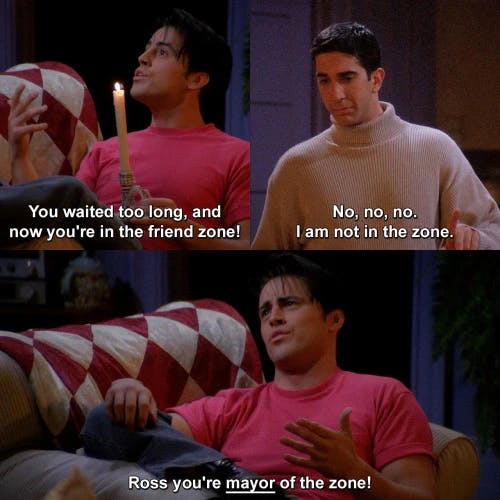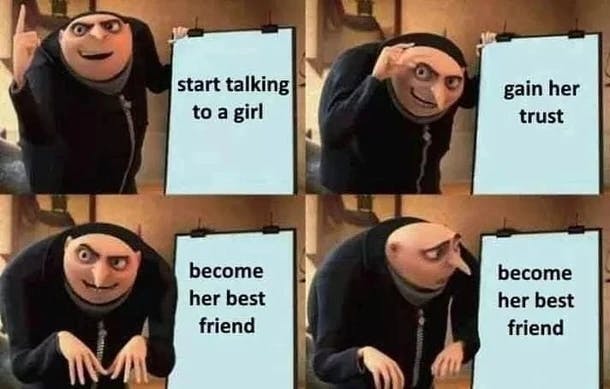Men And Women Have Very Different Versions Of The Friend Zone
Friend-zoning isn’t a one size fits all affair. Turns out, men and women both use the friend zone — they just do it differently.

Men and women have their fair share of differences. From the way we communicate, to what we look for in a partner, to how we interact with our friends, to what we specifically need in order to feel loved, we can easily spot the qualities that make us distinct. But our differences don’t end there.
By now, we’ve all heard of the friend zone, a term to illustrate a situation in which one person wishes to enter a romantic relationship with someone, while the other person would rather keep the relationship platonic. But we also think of the friend zone as a place only women have the power to utilize and only men are subject to banishment by the female object of his affection.

This explains why, for years, the concept of a friend zone has been deemed sexist. We only ever imagine a man complaining that a woman didn’t fall in love with him in exchange for his basic kindness or friendship. The friend zone was painted as yet another piece of evidence that men thought they were entitled to women’s bodies.
But what if that’s not totally true? What if it’s not just men who get friend-zoned, and women who friend-zone? What if we’ve been failing to recognize the ways in which men friend-zone and women get friend-zoned simply because they look different?
Women and the Classic "Friend Zone"
It’s no secret that women are typically more emotionally intelligent and relational than men. We’re more likely to offer empathy and a listening ear when our friends are venting, want to help the people we care about work through their issues, and invest in our friendships through quality time and emotional openness.
When a woman friend-zones a guy, she's looking for all the emotional intimacy of a relationship, without giving him sex or other physical forms of affection. She’ll treat him no differently from the way she treats her closest female friends: seeking and offering advice, processing her pain with him, looking for emotional intimacy, and creating a relationship brimming with trust, safety, loyalty, and long talks over a glass of wine.
She may even expect him to do more "boyfriend" tasks like helping her move, driving her home to make sure she's safe, or fixing her car. She wants all the benefits of a relationship without having to get physical.

Men and the "Hookup Buddy"
We’re all well-aware of the fact that men are generally less emotionally driven and sentimental in their friendships and relationships. Male friendships usually center around doing or achieving something together, or bonding over shared interests and careers.
We might assume that when a guy wants to friend-zone a girl, he’ll just ignore her, keep her at arm’s length, or ask her to introduce him to her cute friend (which, sometimes, they do), but that’s not the only way guys go about friend-zoning. Instead, plenty of guys pursue a no-strings-attached, casual sexual relationship. The relationship is all about physical companionship, with no commitment or emotional connection. Welcome to the world of being a hookup buddy.
Sure, he's calling you up late on Friday nights for a Netflix and chill. He might even bring you to a party to meet his friends. But somehow, the relationship never graduates out of the sleeping together/hanging out phase.

Why It’s Really Confusing for Everyone
Because men don’t normally experience emotional intimacy from their male friends, it’s confusing for them to encounter a friendship that includes that kind of closeness and support, but doesn’t include romance. To most men, this kind of openness and bonding is something they’ve only ever had in the context of romantic relationships. So when a girl offers him everything he associates with a romantic relationship except the actual physical aspects, he’s left feeling led on and bewildered.
Men can end up feeling taken advantage of for their time and masculine presence by a woman who has no intention of letting him actually date her.
On the other hand, despite culture’s push to normalize and glorify casual, meaningless hookups, women typically find it more difficult than men to not become more emotionally attached after sex due to our biological wiring, and normally end up expecting the relationship to develop into something more serious, even if she says she’s fine with keeping things casual — because for the female body, sex isn’t casual. Eventually, a girl in this situation will feel used and strung along for a relationship that never culminated.
She's left heartbroken and confused about why she's good enough to sleep with but not good enough to date.
We tend to focus solely on the ways women friend-zone men and assume a woman’s approach to friend-zoning is the only one, but it turns out it’s not exclusively for women to use.